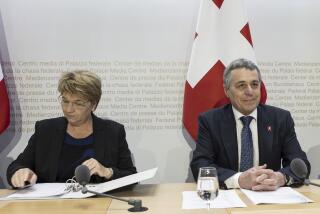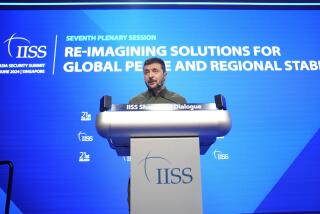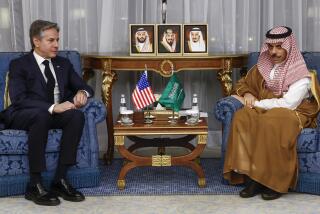Soviet Envoy to Push Talks on Mideast
MOSCOW — President Mikhail S. Gorbachev, bidding to preserve the Soviet Union’s international influence, is sending his principal foreign policy adviser to the Middle East today to assure Arab leaders that Moscow will cooperate with the United States in convening the proposed peace conference for the region.
Yevgeny M. Primakov, the Soviet envoy, will tell Arab leaders that the recent political turmoil here strengthens, rather than weakens, Moscow’s commitment to the joint peace effort, according to Soviet specialists on the region.
Gorbachev and President Bush agreed at their July summit meeting here to sponsor an Arab-Israeli conference next month. But the subsequent upheaval in the Soviet Union diminished this nation’s influence around the world and put in question its ability to act effectively as the conference co-sponsor.
“We can’t deny the impact of all the events of the past month on Soviet foreign policy, but we do want everyone to know that, yes, there is still a Soviet Union and it still is a major player internationally,” a Gorbachev assistant said in explaining the Primakov trip. “We realize the world has questions about our ability to act while we are preoccupied with our own troubles. But it should not question our commitment to such issues as the Mideast conference. That’s the message Primakov will carry.”
Secretary of State James A. Baker III will discuss plans for the conference with Gorbachev and Boris N. Pankin, the new Soviet foreign minister, during talks here this week. Baker arrives today for a meeting of the foreign ministers of the 35-nation Conference on Security and Cooperation in Europe and travels to the Middle East next week.
“The international (Mideast) conference was based, first of all, on the United States and the Soviet as co-convenors,” said an Arab ambassador whose country has agreed to participate in the conference. “With the rightist coup last month, the conference became a big question mark.
“Would Moscow and Washington cooperate?” the envoy asked. “Would they be working together or trying to undermine one another in the region, playing that old game? Would the Soviet Union even want a peace conference? Would the Israelis use a hard-line regime here as an excuse to pull out?”
The collapse of Communist rule and the breakup of the Soviet Union as a unified, federal state brought further questions: With its superpower status so visibly diminished, what influence would the Soviets have in the region? Would Moscow continue the arms sales that have given it much of its influence with such countries as Syria and Iraq? Would it have the political will for the long negotiations needed for a Middle East settlement?
“We are waiting to hear what Primakov has to say,” another Arab diplomat said. “If the Soviet Union is not a credible co-chairman for the conference, the whole process will have to be thought through again, and I am not sure some Arab countries would agree to participate in that case.”
But Soviet specialists on the region said that Moscow’s backing for the Arabs over four decades still gives it great influence, as do its extensive economic ties and the spare parts that will be needed for weapons it has sold there in recent years.
Alexander M. Belonogov, the deputy Soviet foreign minister for Mideast affairs, met here Monday with officials of the Palestine Liberation Organization to make clear Moscow’s determination to proceed with the conference, the PLO said.
“There are countries who say that the crisis in the Soviet Union has changed everything,” a European specialist on the Middle East said, “and that view of the Soviet Union as a world power is not confined to the Arab world. Much will have to be done to assert Soviet credibility in international relations.”
Russian Federation President Boris N. Yeltsin and the leaders of the country’s other constituent republics have already begun to speak on international issues--and to take positions that differ significantly from those that the Soviet Union had expressed before the coup.
Primakov, a specialist on the Middle East and Gorbachev’s special envoy to the region during the Gulf War, will visit Egypt, Iran, Kuwait, Saudi Arabia, Turkey and the United Arab Emirates, said Vitaly I. Churkin, the Soviet Foreign Ministry’s chief spokesman. Primakov will carry personal messages from Gorbachev to each national leader.
His trip will cover much of the ground that Alexander A. Bessmertnykh, the former Soviet foreign minister, had planned to tour about this time. Gorbachev fired Bessmertnykh after the coup for failing to oppose it, then cooperating with its leaders. But Primakov does not plan to visit Syria, Jordan or Israel during this trip, Churkin added, and further preparations will be needed for the conference.
Churkin said Primakov will also discuss economic cooperation, including expanded trade and further loans to the Soviet Union from Saudi Arabia. Greater trade and foreign credits were part of a broader Soviet plan “to alleviate the critical economic situation and possible hardships as we look to the long and difficult winter,” Churkin said.
Alexander N. Yakovlev, one of Gorbachev’s closest associates, will go to Germany later this week on a similar economic mission, Churkin said.
Profile: Yevgeny M. Primakov
Born: Oct. 29, 1929
Birthplace: Kiev, Soviet Union
Education: Moscow Institute of Oriental Studies
Career highlights: Economist, historian and expert on Arab countries. Joined Communist Party, 1959. Middle East correspondent for Pravda, late 1960s. Academy of Sciences, from 1970, in various posts, including director of Institute of World Economy and International Relations. Elected to Congress of People’s Deputies, 1989. Member of Communist Party Central Committee, April, 1989. Special Mideast envoy during Gulf War. Senior foreign policy adviser to Soviet president.
Quote: Americans “sometimes think we can act as they do and thus do not understand the specifics of our country and our economy.”
More to Read
Sign up for Essential California
The most important California stories and recommendations in your inbox every morning.
You may occasionally receive promotional content from the Los Angeles Times.










